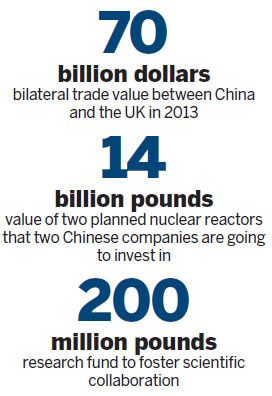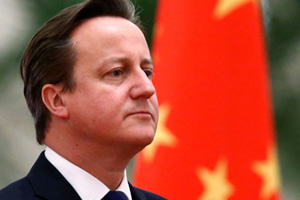China and Europe mean business
|
A lion dance is performed in downtown London's Trafalgar Square. The lion, a Chinese symbol of good fortune, could point the way for strengthened China-EU relations. Yin Gang / Xinhua |

The complementary relationship of the two economies is creating a wealth of opportunities
The economies of China and Europe are highly complementary and many business opportunities are available, especially in financial services, infrastructure, consumer brands and technology sectors, experts say.
In recent years, China's trade and investment links with Europe have grown significantly. In the UK, for example, bilateral trade with China last year was worth $70 billion (51.7 billion euros) - 11 percent higher than the year before.
The existence of strong financial centers in Europe like London, Paris, Frankfurt and Luxembourg provides a good platform for the internationalization of China's currency and Chinese banks.
In London for example, the Bank of China established operations in 1929, and it has been followed in more recent years by many other Chinese banks. The most recent, Shanghai Pudong Development Bank, set up a representative office in London in 2013.
Gerry Grimstone, chairman of TheCityUK, a private-sector association for financial and professional services, says Chinese banks' expansion into London played an important role in facilitating trade and investment flows between China and Europe.
At the same time, Europe's strong financial industry is also helping Chinese banks to become major banks globally.
China is also keen to invest in Europe's infrastructure, both as a way to derive long-term, stable income and to export the infrastructure expertise Chinese companies have accumulated in the domestic market.
Examples of notable infrastructure investments include the purchase of an 8.68 percent stake in Thames Water in 2012 by China Investment Corp, a Chinese sovereign wealth fund, and China Three Gorges Corp's purchase of a 21.35 percent stake in the Portuguese power company EDP in 2011.
More recently, two Chinese nuclear power companies have reached an agreement to invest in the UK's first nuclear power stations in two decades, a milestone move that will demonstrate the strength of the Chinese nuclear industry in Western countries.
The two planned reactors are at Hinkley Point C, in Somerset. Led by EDF Group, they will cost 14 billion ($23.5 billion), and are expected to start operating in 2023 and run for 35 years.

China General Nuclear Power Group and China National Nuclear Corp are expected to have a combined 30 to 40 percent stake in the consortium, with Areva taking another 10 percent. Exact plans are expected later this year after a European Commission decision is made on UK state aid for the project.
Tony Ward, UK head of power and utilities at Ernest & Young, a consultancy, says that Chinese nuclear companies have obvious advantages in international projects due to the experience they had accumulated from domestic nuclear projects.
In addition, Chinese nuclear companies' extensive experience investing in new projects also would help bring down financing costs because it helps lenders feel more assured about their return on the investment, Ward says.
He says if Chinese companies participate in a project like Hinkley Point C as minority investors, they would accumulate experience working on a UK nuclear project. That may help them become majority investors in building and financing future UK nuclear projects.
The strong research and development expertise of European academic institutions, accumulated during years of working with Western companies, could also be very valuable in helping China's industries move up the value chain, says Chris Rudd, a pro-vice-chancellor of the University of Nottingham.
Rudd and his colleagues at the University of Nottingham are currently working with many Chinese companies on research and development. Examples include working with the Chinese aerospace firm Aviation Industry Corp of China with advanced materials and coatings on aircraft engines, and with Chinese digital media Youku and Tudou on new business models to deliver digital online content.
The importance of scientific research is further highlighted by a 200 million research fund to foster scientific collaboration signed by the UK and China during UK Prime Minister David Cameron's China visit last year.
Also, an important trend in Chinese investment is Chinese companies' acquisition of equity stakes in European companies, says Zhou Xiaoming, minister counsellor with the economic and commercial office at the Chinese embassy in London.
Typically, Chinese investors inject capital into European companies with valuable technology or brands. That helps the companies expand locally but they are also introduced to China, where large market demand could generate big growth for the brands, Zhou says.
"British people are very innovative, and they come up with amazing designs. Those ideas and designs can potentially be commercialized, produced and sold on a large scale to bring down costs to generate great profit.
"However, very often British companies do not have the capital to invest in this commercialization, and Britain's market is insufficient to accommodate increased production. But China has both capital and market," he says.
Zhou says a good example of Chinese investment and the Chinese market supporting British technology is the purchase of British company Dynex Semiconductor Ltd in Lincolnshire by the Chinese company Zhuzhou CSR Times Electric. Dynex specializes in a particular type of semiconductor technology.
With financial support from the Chinese company, Dynex built a 12 million pound research center to focus on developing its semiconductor technology.
China's sustained economic boom over the past few decades has created an abundance of capital to be deployed, which could be helpful when invested in European companies that has been starved of capital, says Guy Hands, chairman and chief investment officer of Terra Firma, a private equity firm.
He also says Europe's strengths and experience gained over time could be used to help China overcome immediate challenges it faces today. Hands' views are echoed by Tom Daley, chief executive of the Carbon Trust, a London-based nonprofit company, who added that Europe could share with China ways to meet energy demands while minimizing environmental damage.
cecily.liu@chinadaily.com.cn
(China Daily European Weekly 06/13/2014 page7)






